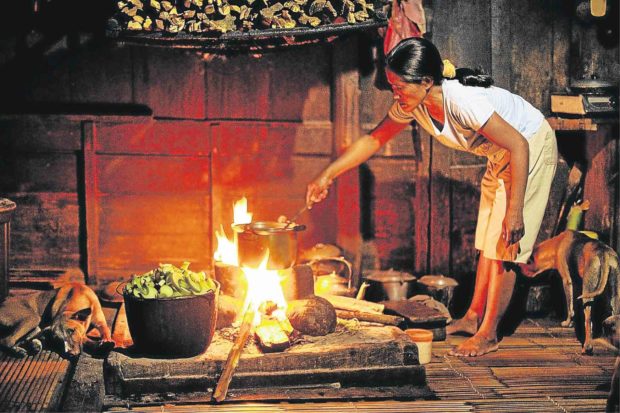
NORTHERN LIFE Life in Kalinga is spartan, but bound by smart indigenous wisdom. The future of these households in Lubuagan town will change if they adapt or reject a proposed new Constitution. EV ESPIRITU
BAGUIO CITY—Cordillera will become a federated region, based on a draft of a new Constitution that will reshape the country into 18 states under a federal system of government.
A proposed revision of the 1987 Constitution will retain Section 15 of Article X which mandated the creation of autonomous regions for the Cordillera and Muslim Mindanao, said members of the constitutional commission formed by President Duterte to craft a federal government Charter.
The draft Charter still acknowledged the “common and distinctive historical and cultural heritage, economic and social structures, and other relevant characteristics” shared by the Cordillera and Muslim Mindanao, said commission member Lawrence Wacnang during a consultation on federalism on June 26 here.
Bangsamoro and Cordillera will also be considered “nonregular” federated regions or states.
Under the draft Charter, Cordillera would be the only state where residents can vote for their governor and vice governor. Other states will elect state assemblies that will select their governor and vice governor.
A Cordillera state defuses fears that the provinces of Abra, Benguet, Mountain Province, Ifugao, Apayao and Kalinga can be fractured and become part of other states.
But Cordillera elders and scholars said they were more interested in how the commission would fight for provisions in the new Constitution to protect the rights of indigenous peoples (IP).
Control of resources
“We will not endorse [a Constitution with] diminishing changes in the recognition of indigenous peoples’ rights in any manner,” said Peter Cosalan, an Ibaloy leader. “It is nonnegotiable.”
The 1987 Constitution “recognizes and promotes the rights of indigenous cultural communities within the framework of national unity and development.”
Section 20 also specified that autonomous regions have control over ancestral domain and natural resources.
Wacnang, a former Kalinga lawmaker, said the draft of the federal Constitution retained 1987 Charter provisions recognizing IP rights that had been improved.
Quoting Section 9 of the draft Charter, Wacnang said development policies and programs of the federal government shall “protect the rights of IP to their ancestral domains, ancestral lands and all resources found therein to ensure their economic social and cultural well-being.”
He said ancestral domains and lands, self-governance and empowerment, social justice and human rights, and cultural integrity were key features of IP rights.
IP rights provisions in the 1987 Constitution were from inputs from sectoral groups, including those outlined by the militant Cordillera Peoples Alliance and from peace negotiations between then President Corazon Aquino and former rebel priest Conrado Balweg.
Righting the wrong
By recognizing these rights, a federal government will still right the wrongs committed against indigenous peoples, said another commission member, Virgilio Bautista.
“It is the answer to the social injustices to the people of these regions,” he said.
The cry for IP rights and self-determination rang out during martial law, particularly in Baguio and Cordillera provinces which resisted Marcos-era projects like the proposed Chico River multipurpose dam.
The dam would have submerged thousands of hectares of ancestral lands and villages in Kalinga and Mountain Province in the 1970s. Opposition grew in 1973 when Cellophil Resources Corp., owned by a crony of former dictator Ferdinand Marcos, was given logging rights over 200,000 hectares of forests in Abra.

